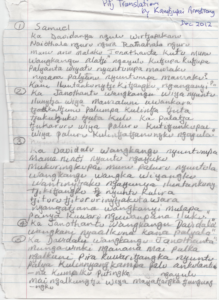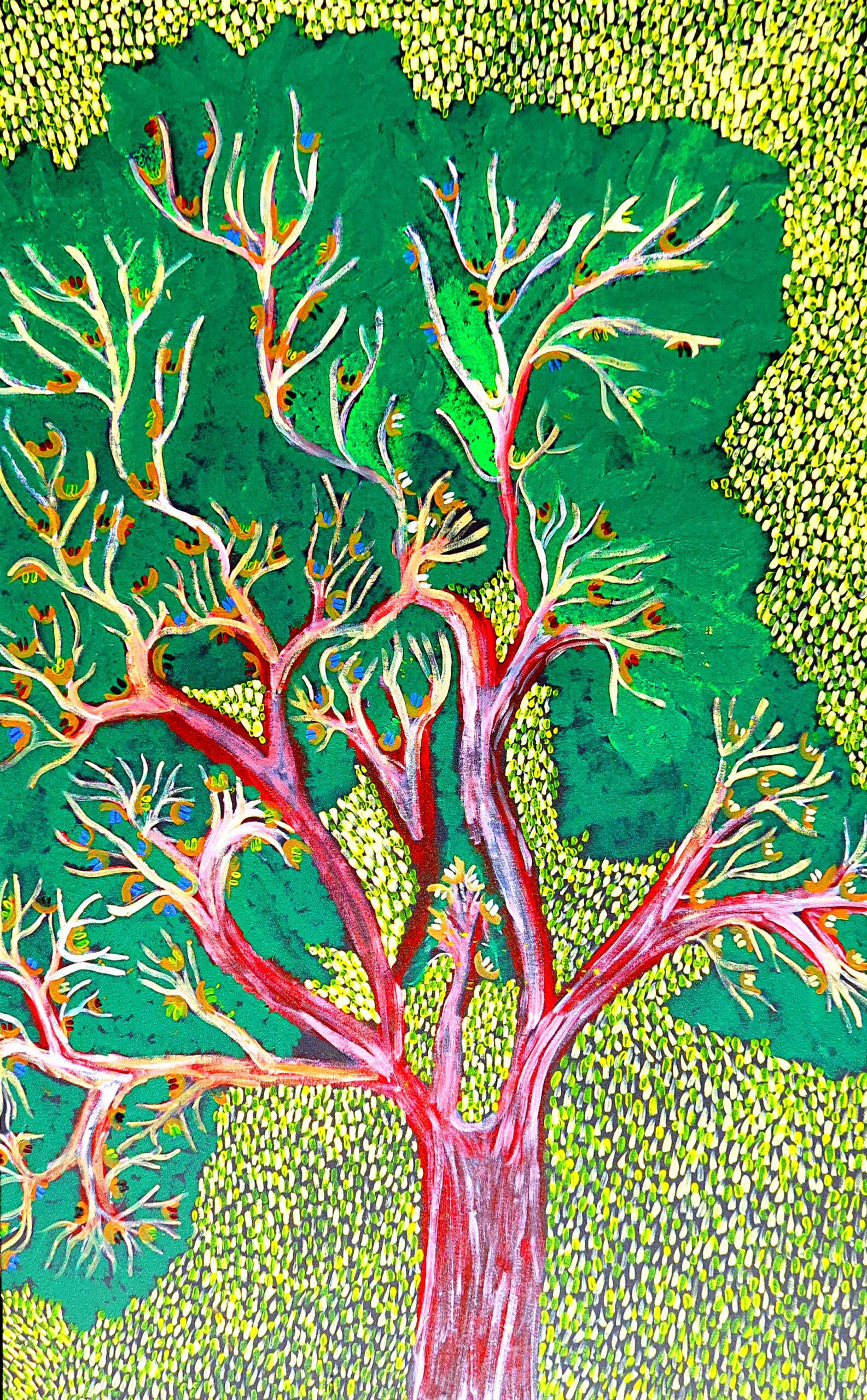In 1990, on the APY lands in South Australia, two women were introduced by the church in Ernabella. This introduction — and the openness of both women to the call of God on their lives — led to a deep and enduring friendship, and a lasting legacy, to the glory of God.
Ann Eckert and Kanytjupai Armstrong’s friendship began and grew as they met to open the Bible together. Their goal was translation; to record the words of God in the Pitjantjatjara language. “I was still fairly new there,” recalls Ann. “We had three daughters, so I had just tried to learn the language. I hadn’t been too active.”
Ann was newly available each morning, with her youngest child in preschool. “I was a beginner, because I wasn’t super fluent in the language, and I didn’t know Kanytjupai,” Ann explains. “Over time I realised what a humble, teachable, patient, and keen person God had provided.”
Ann and Kanytjupai’s friendship grew as they worked on translating the Bible together. “At first, we were shy of each other,” Ann recalls. “I remember when we first started working together, we’d work to morning tea, and she’d go outside, and I’d sit there and wonder if she was going to come back.
She always came back, and gradually we learnt to trust each other.” Kanytjupai invited her school friend Margaret to join them in the task of translation, “Margaret was a wonderful committed Christian,” Ann explains, “and was more bilingual and a good addition to the team.”
Ann and Kanytjupai’s friendship, and partnership in Bible translation, spanned years. They walked through life together, and Ann was at her side in Palliative Care before she passed away. “I remember calling her ‘my hero’,” Ann says, recalling Kanytjupai’s memorial service in 2018. “She never let the sorrows of this world make her bitter, but retained uncomplaining joy in the midst of many losses.” Ann recalls their work together as challenging, and their capacity was often stretched. But together, they had “good fun with many laughs and deep joy.”
From the moment the church at Ernabella chose Kanytjupai to join the task of Bible translation, Kanytjupai found her life’s purpose. “From that moment, she threw herself into that purpose,” Ann recalls. “She never, till her dying day, got distracted from that task. It was God’s purpose for her.”

Kanytjupai’s early life was marked with loss, and that she survived infancy was close to miraculous. “Kanytjupai wondered ever since she was a kid, ‘Why was I kept alive?’” Ann shares. Both her parents died when she was a baby, and her father’s other wife was physically impaired and feeding her own daughter as well as trying to help Kanytjupai. “So technically Kanytjupai shouldn’t have lived; the possibility of her thriving was limited. Missionaries fed her on goats’ milk, and she often wondered, ‘Why in God’s providence did I stay alive?’”
Ann believes that she and Kanytjupai were both called to the task of Bible translation. Born in the United States, working for a church in Florida, Ann recalls as a young woman praying, “Could I do something more significant in my life?” Bible translation was Ann’s ‘more significant’ task.
“I felt a deep sense of call and came to Australia when I was 26.” “We both felt called — it was not just a job, and there was no turning back for us.”
As a team, Ann, Kanytjupai and Margaret set to work on translating the Bible into Pitjantjatjara in the 1990s. “Kanytjupai’s strong ability and passion was insisting on naturalness in the Pitjantjatjara translation without letting the form of English influence our work,” explains Ann. “I worked by pre-studying the text, with commentaries so I could help untangle and clarify meaning.” Kanytjupai’s very strong embrace of natural language complemented Ann’s background in biblical languages and education. Kanytjupai went on to be one of the first to get her Certificate IV in Translating and grew proficient on-the-job.
Ann remembers, “Kanytjupai wanted to be true to the text even if it meant a potential clash with something of traditional culture. She said, ‘I don’t want God to accuse me of tampering with his word.’ Even if it meant misunderstanding or persecution, she remained resolute, and faithful.”
As well as her work in Bible translation, Kanytjupai opened the Bible with many people, quietly working behind the scenes discipling others in the word of God. On more than one occasion, when Ann and her husband Paul asked Christian people from other communities where they had been discipled, they would reply: ‘by Kanytjupai at her homeland.’ “They sought her out,” says Ann. “She must have had a reputation for faithfulness.
She was a good reader, and she was beginning to relate different passages of the Bible together. She opened the Scriptures to them in a way which was meaningful to them.” Kanytjupai was also an artist and painted several biblically inspired paintings, one of which appeared in Our Mob, God’s Story, a book of Aboriginal Christian artwork.
Bible Society’s Louise Sherman complied the artbook, and recalls, “I was eager to have some artwork by Kanytjupai included, because she was such a strong woman of faith. Her love for him compelled her to work on translation so that her community and family would know him and his love the way she did. She contributed a painting based on the parable of the mustard seed.” Louise visited Kanytjupai in hospital in Alice Springs after the book came out and had her sign it.
She says, “I smile whenever I see her name written, thinking of how much she loved Jesus and the Bible and wanted every one of her people to know him.” When the Pitjantjatjara Shorter Bible was published (The New Testament and 15% of the Old Testament) in 2002, Kanytjupai rejoiced, along with many others. “Kanytjupai’s gift was that she wanted the text to be so readable and natural,” says Ann. “In fact, once we published in 2002, we’d find her with her pencil, still wanting to edit, ‘just little bits’! She was a highly tuned editor, in her personal gifting.”
Then, when the team decided to push on with Old Testament translation in 2010, “she got busy again,” says Ann. “Even when a stroke robbed her ability of writing easily, she enlisted ‘scribes’ to continue, even a faithful friend who was with her in ICU once was asked to get to work alongside her!” Kanytjupai first-drafted more of the Old Testament than anyone else to date: Deuteronomy, half of 1 Samuel, Daniel, Proverbs, many Psalms and was more than halfway through the Song of Songs when she passed away in 2018.
Kanytjupai was also able to participate in the Pitjantjatjara New Testament multi-voice recording project in Alice Springs in early 2018. “She was an excellent reader, but she was slowing down,” recalls Ann. “We were so pleased she was able to record three chapters of Romans. She was also at the time translating Song of Songs, so she was doing a written translation, helping with the audio, and she was ill. She had diabetes, she was on dialysis, she had both legs amputated and was in a wheelchair.
She was tenacious.” Kanytjupai wanted to have the audio recording done and could see the opportunity presented by the audio version, including the chance younger children would have to hear it, and the ability to have the Bible on peoples’ phones. “She realised some people couldn’t read; some people wouldn’t read,” says Ann. “The day before she passed away, she wasn’t ready to give up as the translation was not finished,” Ann recalls. She kept singing the chorus “He’ll Never Let Go of Me” in Pitjantjatjara. The next day she passed into his presence.”
Kanytjupai lived a life committed to God, leaving a lasting legacy in the lives she touched and the Scriptures she translated. Her greatest desire was to have God’s word translated into her heart language, Pitjantjatjara, so that more people could know God’s love.
Would you consider supporting this work, which Kanytjupai so joyfully dedicated her life to?
